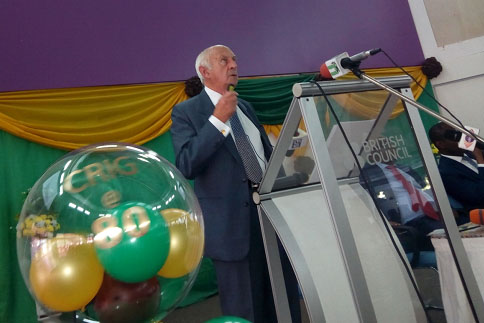Tony Lass speaking at the event
The production of cocoa, which is a major foreign exchange earner for the country, is becoming a less profitable for many farmers in Ghana.
Tony Lass of the Ghana Cocoa Growing Research Association Ltd (GCGRA) in the United Kingdom (UK) made this known on Wednesday in Accra during Cocoa Research Institute of Ghana (CRIG) 80th Anniversary Celebration Public Lecture.
The lecture, which was held under the theme: ‘Innovative Research for National Development,’ was held at the British Council Hall.
Mr. Lass, who recounted his early days in the Ghanaian cocoa sector beginning from 1967 when he first arrived in the country, bemoaned the ‘poor’ motivation of cocoa farmers currently in Ghana.
According to him, many cocoa farms are rapidly being destroyed for other economic activities, with the sector appearing to be unattractive for the youth.
“The days when Ghanaian cocoa farmers used to be wealthy and very important to the socio-economic development of the country appear to have been fast eroded and the future looks so uncertain for the sector which has since independence been the backbone of the country’s economy,” he said.
Mr. Lass noted that cocoa farmers used to be highly respected people in comparison to non-cocoa farmers.
“Many farmers do not know that agrochemical are not just expensive but are poisonous to their plants,” he said.
Mr. Lass advised farmers to use resistant planting materials to help cocoa crops withstand future weather change.
Unfortunately, he said, many Ghanaian cocoa farmers are getting old and the young ones who are supposed to replace them perhaps do not want to have anything to do with the sector.
Respect Farmers
Professor Yaw Ahenkorah, who is an expert in soil chemistry and fertility and delivered the first lecture, stressed the need for all and sundry to respect farmers in the country.
“Without cocoa there is no chocolate and without the cocoa farmers there is no cocoa. Therefore the cocoa farmer is the supremo,” he said.
He added that there was the need to maximize shade effect in cocoa farms in Ghana which positively affects cocoa yield.
He said that CRIG has come out with a lot of recommendations and called on government to adopt them.
He urged government to deal with problems that affect research in the country, stating that research is very central to the yield of farmers.
Former Rector of Ghana Institute of Management and Public Administration (GIMPA), Stephen Addae, said that research into cocoa production must be taken seriously in Ghana.
He said, “Without CRIG there will be no cocoa industry in Ghana and the Ghanaian economy would have been worst off.”
Background
CRIG was established in June 1938 at Tafo to tackle diseases and pests, which had considerably reduced cocoa production in the Eastern Province.
In 1944, it became the West African Cocoa Research Institute (WACRI), and after Ghana’s independence, WACRI was dissolved and CRIG formed in its place.
By Melvin Tarlue & Amanallah Tahiru


